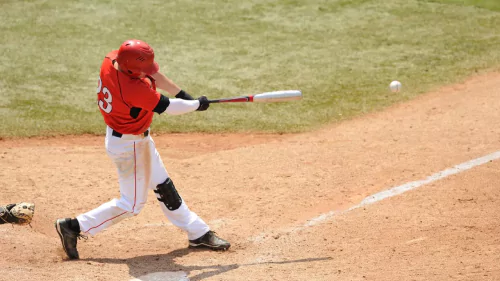Ask any athlete what they believe to be the ingredients of success and I guarantee almost every one of them will include hard work. This is absolutely true. Especially when physical training is combined with athlete mental training.
Hard work and putting training time in is often associated with physical skills. While this is an important piece, it’s not the only aspect of training an athlete needs to focus on.
The mind is a key piece to the success you experience on the field or court. By strengthening your mind through athlete mental training, you will put yourself closer to the potential you know you’re capable of achieving.
What Is Athlete Mental Training
Before we get into why mental training is so beneficial to you as an athlete, let’s discuss what exactly this concept is in the first place.
It can be easy to grow confused when we discuss training the mind. It’s easy to see how the body is trained, as it’s a physical entity. You feel the fatigue from practice and the sweat dripping down your face after a long weightlifting session.
But what does it look like to train mentally?
Athlete mental training is the practice of improving skills and characteristics of the mind. These include confidence, focus, motivation, self-awareness, resilience, and many other intangibles that are necessary to becoming a complete player.
Just as with physical training, there are activities you can use on a daily basis that facilitate the improvement of these skills. We’ll get into those in a little while, but first, let’s examine just why mental training is such an important practice for you to adopt as an athlete.
Why Mental Training Matters
Athlete mental training matters because it is a proactive approach to improving skills that are well known to be crucial to your success.
Think about confidence, for example. Every coach preaches the importance of being confident. Yet…how do you actually go about developing confidence?
That’s why mental training matters.
You want to think about mental training from two different approaches: proactive and reactive.
A proactive approach focuses on building the positive mental characteristics you need. In other words, you work on proactively strengthening your mind.
A reactive approach involves using mental training to build these positive traits as a way to overcome the current mental game challenges you’re facing as an athlete.
The main mental game challenges you may struggle with include:
- Fear of Failure
- Performance Anxiety
- Perfectionism
- Social Approval
- Outcome-Oriented Thinking
- Negative Self-Talk
- Low Confidence
Training your mind works to overcome these challenges while simultaneously building a stronger mind. That is why mental training matters.
Once you adopt a mental training practice, there are many positive benefits you can expect, including:
- Increased Confidence
- Reduced Anxiety
- Stronger Focus
- Greater Resilience
- Positive Self-Talk
- Self-Management
- Increased Motivation
- Stronger Mental Toughness
- Greater Enjoyment
Top Mental Training Tools for Athletes
To perform mental training, you need tools to do so. It is through the consistent use of such tools that the benefits listed above are developed.
My philosophy when working with athletes is generating a daily routine. One that can be easily followed which works towards strengthening the mind.
Think of this much in the same way you do strengthening your body.
Your strength and conditioning coach will put together a routine for you to follow that over time, will increase your strength.
Athlete mental training needs to be approached the same way. Yet, luckily for you, an hour a day is not necessary. You can perform all the tools in a short period of time…as long as you’re consistent with your practice.
Mental Training Tools to Use:
- Self-Talk
- Mental Imagery
- Mindfulness
- Process Goals
- Journaling
- Breath Work
Getting Started with Mental Training
Training is a key ingredient to success. There’s no way of reaching your full potential without it.
As an athlete, training your body and skills is a no brainer. But what about your mind? How much work are you putting into strengthening the mental skills you need to play your best?
Just as with physical training, you must put forth consistent effort to train your mind. To do so, you need a plan to follow.
To get started with athlete mental training, click here to learn about Mental Training Advantage. A program that will show you all the mental training tools you need to build a championship mindset.





